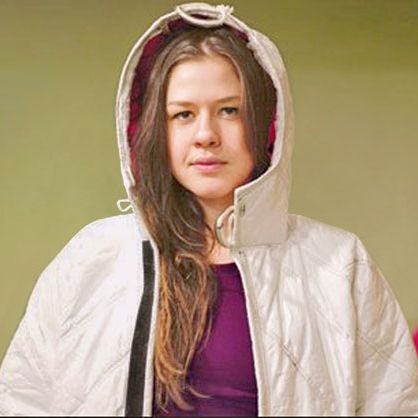The Butterfly Effect
I realized that I would be in Gaza on New Year 's Eve, a place that is besieged, destroyed, and I doubted there will be much celebration on that evening.
A Red Thong in Gaza
The butterfly effect is a metaphor for the concept that small, seemingly insignificant events—like the fluttering of a butterfly's wings—can produce tremendous and unanticipated consequences. In this blog, Zainab Salbi, the founder of the humanitarian group Women for Women International, explores the often untapped and under-appreciated capacity of women around the world to cause major and lasting change for good.
Read Zainab's previous blog post here.
Over some delicious Persian food, including my favorite Fasanjoon cooked with a beautiful combination of crushed walnuts and pomegranate sauce, a group of women, all in their late thirties/early forties, got together for a girlfriends' dinner in London. We talked about our lives in our home countries (theirs Iran and mine Iraq), our lives in our new countries (theirs England and mine US). We talked a bit about work, the financial crisis, and then the conversation switched to our search for love and our failures to find it. One of the women told us about what her brother's Italian girlfriend gave her to help her find love: A red thong. She explained that if you wore a red thong on New Year's Eve, the following year will be filled with love, but you must get the thong as a gift—you can not buy it. The other women giggled, laughed, and we begged her to give us each a red thong as a gift before New Year's Eve.
Sure enough, the next day when I entered my hotel room after a long day of meetings, I saw a package in my room, wrapped with red ribbon. There was a red, lace thong in it. I laughed and laughed as I realized that I would be in Gaza on New Year 's Eve, a place that is besieged, destroyed, and I doubted there will be much celebration on that evening in Gaza. But my search for love will not deter me from wearing the red thong, in case that Italian tradition really works.
I left London and embarked on a long journey to the Middle East that started with Jordan, Iraq, Lebanon, and finally Egypt, the point of entry into Gaza. The night before my departure to Gaza on December 30th, I packed a small bag for my 2-day trip to Gaza. I packed my jeans, my layers of clothing from camping clothes to conservative shirts, and then I squeezed in the red thong, still wrapped in its red tissue, as my little secret. The next morning, the people who were supposed to go on the trip, organized by Code Pink, met at 6 am at the bus station. There were journalists, film makers, activists, and some who worked in humanitarian organizations like me. What was supposed to be a 6-hour bus ride took us 17 hours. The delay was caused by many reasons, starting with arguments among the participants, to Egyptian security, to long delays at the borders.
All my senses were on alert during those 17, long hours. I listened to people's arguments, observed the deserts we were passing through, as well as the small oases that were so lush in the midst of the desert. Then there was the Swiss canal, where there was once a major war that is to this day very much considered symbolic of a turning point in Egyptian history. There was the security guard oin the bus and his big gun underneath his jacket. He talked about his wife and his new baby. There were the Egyptian passport officers at the borders, cheery, making one joke after another as they stamped our passports. These were by far the most fun passport officers I have ever met in all my travels. Then there was the seriousness of the Palestinian passport officers and the border's office in general. It was filled with Hamas security guards with their rigid attire and looks that reminded me of the secret service in Iraq during Saddam's time. They had the same stern look with their carefully shaped beards and fitted black suits with no ties. I told them that they reminded me of Saddam's time when they made the announcement that they will keep our passports and not give it to us until we leave. The only difference, I thought to myself, was that Saddam's security guards had thick black mustache and they always wore military fatigue. The sternness, rigidity, seriousness, and stiffness were all the same. They didn't like my comment but they did return the passports.
Stay In The Know
Get exclusive access to fashion and beauty trends, hot-off-the-press celebrity news, and more.
By the time we arrived at the hotel in Gaza, it was about midnight and we were utterly exhausted. The next morning, I decided not to join the big group of travelers, opting instead to call the women and children's organizations I had identified on the ground for interviews and my own independent research on the reality in Gaza. I woke up after everyone left the hotel, showered and I put on my red thong because it was December 31st and I wasn't sure if I would get the chance to change before midnight. I didn't' want to take a chance. I have been divorced for 3 years now and while I really enjoyed my single status all these years, enjoyed the quiet time, the reflection time, the freedom I had to roam around and explore all that I wanted to explore at anytime I wanted, I had reached the stage where I am now ready for intimate love in my life. I don't know if that coincided with my 40th birthday a few months ago or not; all I know is that I want it as much as I want to continue my work on women's rights and women survivors of wars. I loved the opportunity to be in Gaza; the vulnerable woman in me also wanted the opportunity to find love in 2010, and that red thong was, for the moment, my magical hope.
I went down to get my strong, Turkish coffee with no sugar as I always drink it, enjoying its bitterness and strength, ate my Zeit wa Zaatar (a traditional Palestinian breakfast bread dipped in olive oil with a combination of herbs that includes oregano, sesame, and somaak) in a quiet garden at the hotel as I waited for Nahid, the woman who ended up being my guide in Gaza. When she arrived and learned about Hamas' control over the visitors' mobility, she offered me the opportunity to stay at her home that night. I decided to take her up on the offer. I learned from my travels to various war zones that there is nothing better than staying with a family and seeing the war through their eyes and how they are living it.
Within 15 minutes of leaving the hotel arriving at her apartment, Hamas security officers came and told me that I had left the hotel without permission. I was furious! They brought back memories of Saddam's totalitarian regime. I had lived in the fear brought about by these kinds of security men for 20 years once before, and I was not about to take that anymore. After much argument, I told them if they refused to let me move in Gaza alone, I would go back to the hotel, refuse to leave it, and write about their suppression of freedom of movement within Gaza. "You can force me to go back to the hotel but you can not control what I will write about my experience with you in international press".
That was the sentence that led them to change their minds. "OK, OK, go. We are sorry. We apologize. You are free to roam around. We are just trying to protect you for your own security." They left. I was left shaken, as was my new friend and the driver we hired to take us around. Deep down I thought of my red thong and the irony of wearing it that day in search of love as I argue with Hamas security and demand my freedom of movement to learn about the reality of Gaza through the eyes of women and the civilian population.
Finally, at around 11 am, I started the journey to see Gaza. One does not need to move much before seeing the destruction that was caused by the 23 days of war in December/January of last year. Israel responded to Hamas's missiles with perhaps one of the harshest attacks with the most severe destruction I have ever seen, except for the damages caused in my home country Iraq. It felt that everything was destroyed, schools, including the American school, hospitals, people's homes, farm land, fishermen's boats, and more. The destruction was so severe; it felt like it was done with such vengeance and utter and deep destruction of a people and their lives. It was horrible! I have lived and worked in wars for 30 years now, studied the concepts of just and unjust wars, what is allowed and not allowed, and in that day I thought that there can not be any cause whatsoever that justifies such destruction. It just can not lead to anything but more hate and more wars. That can never be the solution.
I visited a woman who was only a few years older than me but has 6 children, who was tortured in an Israeli prison for two years when she was 18 years old. Sh married a man who she glanced at while she was in the women's line in the prison and he was in the men's line. Together they saved for 20 years to build a house that can shelter their children and now their grandchildren. They gave up politics a long time ago—they were leftist and against Hamas—but when the Israeli missles punctured a hole in their house, it did not care who they were. The missle did not distinguish between their story, how they had been just trying to live decently in the past 20 years, and how their life's savings had all gone with the destruction of their home.
It had been exactly a year since their house was destroyed. They have not been able to fix it, both because they have no money and because of lack of construction material. They showed me the room they live in, with the plastic sheets taped onto destroyed walls with phosphorus bombs. Because it was raining the night before, all their blankets were wet and they slept with wet blankets all night. They showed me their circumstances without complaining, but with a sense of despair, disbelief, not of hopelessness but a lack of knowing how this can all be brought together. They asked for nothing and offered me unsweetened Turkish coffee (a sign of poverty, as coffee should always be offered with sugar to show hospitality). As I leave their house, bid them farewell, wish them luck, I am embarrassed at my own secret wish that day reflected by my red thong. There are people who are struggling with life and death every single day and here I am wearing my red thong hoping and praying for "love" I think to myself. Is it shameful or just simply being human?
I then visited some farmers who were working on their organic strawberry farm. As I walked in the middle of their farmed land, I picked and ate some delicious strawberries as I listened to the farmers describe to me what land was destroyed, what they were farming before, how they saw the land, and how they were trying to bring the land back together, this time with organic farming. They were excited about the organic part, as it was cheaper and more efficient for them. I thought to myself that there is nothing this earth needs more than some organic love and care to restore it from all the bombs, all the destruction and the poison in it. We then passed by the American school and got out of the car to see how it was so fully destroyed. Next we visited a place where most of the metal and debris of the war is piled in vast areas surrounded by destroyed pieces of homes, hospitals and schools. We visited some fishermen who showed me their destroyed fishing boats and how they haven't been able to earn an income for a year because they can no longer fish. I learned that for those whose boats escaped the destruction, they can no longer go more than 15 kilometers into the sea, which impacts significantly their ability to catch sardines and sell them commercially to Israel and Egypt, which was their source of income.
As one fisherman was telling me that story in his house, where again he and his family were living in the midst of destroyed rooms with huge holes in the wall and plastic wrap to cover it, a speed boat passed by. He pointed it out to me and says, "You see this guy? He is taking a risk by going deeper than 15 kilometer. He may get shot by the Israelis." "So why is he doing it?", I ask. "We can't catch fish to earn a living within 15 kilometers. So some just loose it and can no longer handle their poverty; they take a risk even if they die in the process.. Acts of desperation." Acts of desperation, I repeat to myself.
By that time I was exhausted already but I didn't want to stop, so I visited a women's rights activist who is a lawyer and leads a defense fund for poor women in Gaza. Her name is also Zainab. She is lonely and she has dedicated her life to the cause. We giggled and laughed after a fast bonding experience. On New Year's Eve, I found her alone in her home hoping for some guests to visit and talk to her—that day it was me and Nahid. Zainab did not stop talking. She talked and talked and talked about cases she was working on, divorce, custody, inheritance, about fighting a recent law that Hamas just passed requiring women lawyers to wear a headscarf, or about the informal way in which Hamas managed to pass a regulation that all school girls must wear headscarves, and about how Hamas organized picnics for women's "entertainment" where they also distributed headscarves for free, and about how she feels more and more lonely in a society where it is becoming more conservative, more religious, more totalitarian. She and a few other women's rights activist are becoming more and more alone in the Gaza District.
Zainab talked for hours, non-stop until Nahid and I turned to each other as we were both hungry and tired and Nahid needed to go and check on her two boys at home. We offered Zainab to come and spend the rest of the evening with us, and she took us on our offer. We spent the evening with Nahid's husband who is an artist, Nahid who works with a humanitarian organization for children, another man who is an author and a novelist, Zainab the lawyer, and two boys ages 9 and 7, who are Nahid's kids. The adults spent the evening talking about the besiege of Gaza; the tunnels that are controlled by Hamas, who charges monthly fees for their operations; what is allowed to enter the city and what is not; the disparity between those who are non-Hamas supporters and get only very limited aid from the UN and independent agencies because of a complete blockade from Hamas; and how even if you try to avoid buying anything that arrives from the tunnels so as not to support Hamas, you have no choice but to give up because Israel sometimes keeps the borders closed so long that people really have no choice. They talk about what they were doing last year around the same time, about the fear they had from the Israeli bombs, and how they each had different reaction: some could sleep, some couldn't at all.
The conversation was somber. There was no sense of celebration whatsoever, no sense of hope or change. It was but a day like another day in Gaza, full of complexities and besiege over besiege over besiege. Someone like Nahid and her friends and family feel more and more isolated in their own home, which is besieged from the outside by Israel and also Egypt (who is not only building an outer wall around Gaza but an inner steel wall to stop the tunnels as well). They are equally besieged by the totalitarian regime of Hamas who is giving people less and less room to breathe.
At 5 minutes to midnight, the kids came with their Quitar and Oud (a 10 strings Arabic musical instrument), and started playing happy birthday for the New Year. We smiled and clapped for them, kissed the kids and showed them with effort some kind of excitement. We watched how people in France were celebrating New Years with songs and dances. Nahid put the kids to bed, her husband wished us goodnight and Happy New Year and went to bed, and as she helped me set the sofa into a makeshift bed, she started for the first time that whole day telling me how the war almost led to the destruction of their marriage. "We processed it in different ways," she began. "It impacted us in different ways. He expressed it through his tears, paintings and writings, and I did it through organizing a bread distribution system for as many families as I could. I held own to my kids every moment so I wouldn't loose them. He cried and I felt I had to be strong and survive." Some tears broke out of her eyes. Some tears broke out of mine. That was how my parent's marriage was destroyed too, I thought to myself as I got into my makeshift bed and thought once again of the irony of my wearing a red thong in Gaza on New Years Eve.
-
 Let's Go, PPG, Fans! A New Peacock Series Starring the 'Love Island USA' Season 6 Cast Is Coming Soon
Let's Go, PPG, Fans! A New Peacock Series Starring the 'Love Island USA' Season 6 Cast Is Coming SoonWe're already clearing our summer schedules for 'Love Island: Beyond the Villa.'
By Quinci LeGardye
-
 Why Princess Diana Didn't Move to America
Why Princess Diana Didn't Move to AmericaThe late royal's friend opened up about the princess's American dream.
By Kristin Contino
-
 Anne Hathaway Doubles Down on Luxury's Favorite Neutral
Anne Hathaway Doubles Down on Luxury's Favorite NeutralShe painted herself in the timeless hue.
By Kelsey Stiegman
-
 Christy Turlington Burns' Deeply Personal Story on Death During Childbirth
Christy Turlington Burns' Deeply Personal Story on Death During ChildbirthChristy Turlington Burns' Deeply Personal Story on Death During Childbirth
By Max Chafkin
-
 Jennifer Hudson's Secret to Finding Hope After Loss
Jennifer Hudson's Secret to Finding Hope After LossJennifer Hudson's Secret to Finding Hope After Loss
By Max Chafkin
-
 Jennifer Garner's Touching Story of Remembering Children Others Forgot
Jennifer Garner's Touching Story of Remembering Children Others ForgotJennifer Garner is remember the children that everyone else forgot.
By Max Chafkin
-
 Taylor Swift Has Given Grief a Voice
Taylor Swift Has Given Grief a VoiceTaylor Swift Has Given Grief a Voice
By Max Chafkin
-
 Cecile Richards Has Our Back and Yours....Always (#THANKS!)
Cecile Richards Has Our Back and Yours....Always (#THANKS!)Cecile Richards Has Our Back and Yours....Always (#THANKS!)
By Christopher Lawrence
-
 Veronika Scott: One Woman, One Brilliant Idea
Veronika Scott: One Woman, One Brilliant IdeaVeronika Scott is providing Detroit's homeless women with the skills to earn a paycheck.
By Melissa Bykofsky
-
 Olivia Wilde Collaborates with Yoana Baraschi and Anthropologie for Conscious Commerce
Olivia Wilde Collaborates with Yoana Baraschi and Anthropologie for Conscious CommerceOlivia Wilde has taken on fashion for philanthropy with her charity Conscious Commerce, designer Yoana Baraschi, and Anthropologie to create the New Light dress.
By Karen Hill
-
 Beyoncé to Headline Chime for Change's "The Sound of Change" Concert
Beyoncé to Headline Chime for Change's "The Sound of Change" ConcertChime for Change will hold a televised concert event at Londons Twickenham Stadium on June 1, 2013, with Co-founder and Artistic Director, Beyoncé as the headliner.
By Marie Claire